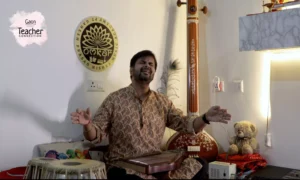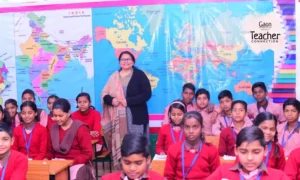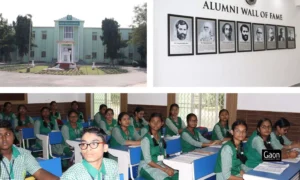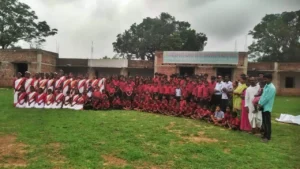Kareena Jagat, a 21- year-old student is from a tribal community in Bhopal. She said her decision to study at the Jeevan Shiksha Pahal on the outskirts of Bhopal, changed her life. Jagat’s mother works as a helper in a catering business while her father is a daily wage labourer who digs ditches, etc. She has two siblings.
“In my early childhood, when I studied at a government school, I constantly faced casteist slurs from both teachers and other students and it made me feel terrible. I couldn’t cope with it so I left the government school and came to Jeevan Shiksha Pahal in 2016, where I studied from class eight to class 12,” Jagat, who belongs to the Gond community, told Gaon Connection.
She is 21 years old today and an undergraduate student at the prestigious Azim Premji University, Bengaluru, Karnataka where she studies social science.
Transforming lives
Jeevan Shiksha Pahal has made learning a happy experience to many others like Jagat, who come from the Gond and Pardhi tribal communities in Madhya Pradesh.
It was in 2005 that the Jeevan Shiksha Pahal began as an informal teaching institution at a rented location. It came up to provide education to the children of the Gond and the Pardhi tribal communities that are classified as Denotified Tribes. It later moved into its own school building in 2017.

The school provides free education to its students and there are good samaritans who donate to the school annually.
Studying in mainstream schools can be a sorrowful and traumatic experience for the children from tribal communities, said the school’s principal, Brajesh Verma. “The family members of our students are mostly rag pickers, beggars and people who do menial jobs for a living. Their children have to face discrimination at the hands of their classmates in the government schools,” Verma, told Gaon Connection.
Also Read: Shiksha Rickshaw Abhiyan Is Spreading Smiles And Education Among Kids of Construction Workers
Kuldeesh Pawar, a student of Jeevan Shiksha Pahal school can vouch for that too. In 2011, when Kuldeesh Pawar, then 12 years old, and from a forest dwelling community in Bhopal, Madhya Pradesh was enrolled at the local government-run elementary school, he had not anticipated the hatred he faced.
“My classmates there bullied me and looked down on me because I was from a tribal community. It was hurtful,” Pawar told Gaon Connection. But in 2018, Pawar found that safe space and learning environment that he craved for in Jeevan Shiksha Pahal School.
“This new school changed my life. Nobody taunted me here about my tribal background. I felt I could do something good in life,” Pawar said.
Pawar’s mother is a rag picker while his Dad drives a trash truck. Pawar has three siblings, and on weekends when he is not in school, he works as a waiter at a catering business. He gets paid about Rs 350 per event he works for.
Also Read: A book bank that enriches students
Asif, an 18-year-old student from the Pardhi community and a resident of Rajeev Nagar in Bhopal, told Gaon Connection the same thing.
“I graduated from Jeevan Shiksha Pahal in 2020. The teachers there are extremely supportive and ensure that the children are learning something new everyday. When I came here, I could sense that this is an environment where I can be myself and will not be judged for my identity and the community I belong to,” he said.
Asif’s mother is the sole breadwinner as his father is dead. She is a rag picker and she has seven children. Asif is the only one studying at this school.
The principal said what these children faced in society was disgraceful. “The kind of discrimination and stereotyping that these children deal with is awful. They have constantly been told to go study in their own space and not enter urban, mainstream localities,” he said.
After working out of a rented building for years, in 2017, Muskaan decided to construct a school building with mud and bricks. There were now classrooms, a library and an assembly ground.
“Initially, we only had classes from one to eight, but in 2017, we extended the classes till class 12th under the NIOS [National Institute of Open Schools] affiliation,” the principal added proudly.
Also Read: Children of the Pardhi ‘hunting’ tribe emerge as writers, theatre artists and Gond art painters
The school provides free education to its students and there are good samaritans who donate to the school annually. The students are provided stationery. “The donations also enable us to help students pay for examination forms,” Verma said.
“Recently we received a donation of Rs 3 lakh from a shipping company based in Mumbai. This money will be used for the students,” he added.
Jeevan Shiksha Pahal provides a learning space with a multilingual approach as it is difficult for the children from the tribal communities to communicate in English or Hindi right away.
“Our teachers speak to the students in their language so as to make it easy for them to understand things better. This is possible because most of the teachers we hire are from the same communities as that of the students studying here,” Verma said.


















